|

Carlo Carrą
(February 11, 1881 – April 13, 1966)
_______________________
The Reading Brain in the Digital Age:
The Science of Paper versus Screens
Ferris Jabr
(....)
How exactly does the technology we use to read change the way we read? How reading on screens differs from reading on paper is relevant not just to the youngest among us, but to just about everyone who reads—to anyone who routinely switches between working long hours in front of a computer at the office and leisurely reading paper magazines and books at home; to people who have embraced e-readers for their convenience and portability, but admit that for some reason they still prefer reading on paper; and to those who have already vowed to forgo tree pulp entirely. As digital texts and technologies become more prevalent, we gain new and more mobile ways of reading—but are we still reading as attentively and thoroughly? How do our brains respond differently to onscreen text than to words on paper? Should we be worried about dividing our attention between pixels and ink or is the validity of such concerns paper-thin?...(more)
_______________________
Paying Attention
Deborah Barlow
slow muse
Do stuff. Be clenched, curious. Not waiting for inspiration’s shove or society’s kiss on your forehead. Pay attention. It’s all about paying attention. Attention is vitality. It connects you with others. It makes you eager. Stay eager.
–Susan Sontag
Susan Sontag’s words are inspriring for anyone, not just artists. In Buddha’s Brain: The Practical Neuroscience of Happiness, Love and Wisdom, Rick Hanson makes the claim that attention actually shapes the brain. What we pay attention to is what gets built into our brain tissue, and our neurons are wired in respond to what we focus on.
But what is this paying attention that Sontag talks of? ...(more)
_______________________
Don’t be bored, don’t be lazy, don’t be trivial, and don’t be proud. The slightest loss of attention leads to death.
— Frank O’Hara, 1964
Take Five
Why the slightest loss of attention still leads to death.
Marjorie Perloff
(....)
The slightest loss of attention leads to death. O’Hara’s aphorism is little honored these days when any and all demands upon poetry as an art form are dismissed as elitist, undemocratic, and just plain cranky. To declare oneself a poet is to be a poet! Basta! Who’s to say otherwise, to spoil the party? Here again I turn to Pound:
The mastery of any art is the work of a lifetime. I should not discriminate between the “amateur” and the “professional.” Or rather I should discriminate quite often in favor of the amateur, but I should discriminate between the amateur and the expert. It is certain that the present chaos will endure until the Art of poetry has been preached down the amateur gullet, until there is such a general understanding of the fact that poetry is an art and not a pastime.
And Pound adds:
If a certain thing was said once for all in Atlantis or Arcadia, in 450 Before Christ or in 1290 after, it is not for us moderns to go saying it over, or to go obscuring the memory of the dead by saying the same thing with less skill and less conviction.
Or so common sense would tell us....(more)
via The Page - Poetry, essays, ideas
_______________________

Halbmond über dem Meer
1945
Emil Nolde
1867 - 1956
_______________________
Plume [After Isaiah]
Tom Daley
pedestal
And the moon is a gull lost in the slick of days
Where it left its pincers in the breath of clams
Near where the road curves and the beachfronts fall
Each year a terrible trembling in the mannequins
Each year a new Interstate sign blazons the mannequin’s sweater
Verily I say to you there shall come a time when even your own coffin is misplaced
When the children of your neighbors shall fish in your ashes for calcium to feed
their mice
When your chiselings and carvings will find their diatribe in the rubbed-out wind
And headstones are left to the mercy of the careless mowers
Where every boll weevil is grinning, having fed on a councilor’s mouth
Where the world will suffer the indemnities of the whiteflies, a hand shall stir them
into ashes
...(more)
Five Poems Tom Daley red peter
Eight PoemsTom Daley archipelago_______________________

James Ensor
b. April 13, 1860
_______________________
Today's Homily :
"Wall Street Finds Its Own Uses For Things"
Ray Davis.
pseudopodium
Populist democracy wasn't created as a capitalist tool, but when populism threatens money it's simple enough for money to take up populism. Simpler to campaign when you don't have to leave a day job, or when you can afford to make it someone else's day job.
_______________________
The Progressive Movement is a PR Front for Rich Democrats
John Stauber
(....)
Does this information concern you? If not, you need to get out of the propaganda bubble of your Progressive Movement echo chamber and think. Think hard. Think about fundamental, radical, democratic, social and economic change, who might bring it about and how. Ask yourself if the the rich elite, the 1%, are going to fund that. Leave The Nation and Mother Jones on the shelf; turn off Ed Schultz, Rachel Madow and Chris Hayes; don’t open that barrage of email missives from Alternet, Media Matters, MoveOn, and the other think tanks; and get your head out of the liberal blogosphere for a couple days. Clear your mind and consider this:
The self-labeled Progressive Movement that has arisen over the past decade is primarily one big propaganda campaign serving the political interests of the the Democratic Party’s richest one-percent who created it. The funders and owners of the Progressive Movement get richer and richer off Wall Street and the corporate system. But they happen to be Democrats, cultural and social liberals who can’t stomach Republican policies, and so after bruising electoral defeats a decade ago they decided to buy a movement, one just like the Republicans, a copy.
The Progressive Movement that exists today is their success story....(more)
_______________________
Radical Centrism: Uniting the Radical Left and the Radical Right
Pragmatic Centrism Is Crony Capitalism
Ashwin Parameswaran
Macroeconomic Resilience
_______________________
Ding Dong! When Protest Songs Weren’t Dead
Kenan Malik
So, those who despise Margaret Thatcher for her vindictiveness and spitefulness want to celebrate her death by propelling into the charts a song about the death of a witch. Those who laud Thatcher for her supposed love of freedom want to ban that song. And the BBC settles on a cackhanded ‘compromise’ by censorsing the song while pretending it is doing no such thing. Nothing, perhaps, could better express the inanity of contemporary politics than the crass, puerile controversy around Ding Dong the Wicked Witch is Dead. Once, protest songs provided the soundtrack to political struggle. Now political struggle is reduced to getting old songs into the charts.
But what of the actual protest songs of the Thatcher years? ...(more)
_______________________
Decay and Ruin in Mrs. Thatcher’s England
interview with Tariq Ali
_______________________

Mountain Slope over the Sea
(c1950)
Emil Nolde
_______________________
After a Stroke, My Mother Addresses the Lord While Watching Footage of the Aftermath of the Earthquake in Haiti
Tom Daley
Where are the women running, Lord,
their purses hooked on sleepless shoulders,
their streets flush with chairs,
with unshaven African gods?
Mason who made Port-au-Prince,
Mason who unmade the city in seven seconds,
you have made me, and ruined me.
Lord of cement and ricket,
you shaped us all in your own image —
every desiccated would-be grand-mčre,
every lumpen soon-to-be amputee,
every mambo priestess bedecking her household altar
with a white candle and a glass of clear water.
...(more)
Witness
Redemption – Vol. XXVI No. 1 (Spring 2013)
_______________________

J. M. W. Turner
_______________________
Discourses on vocality
Vanessa Place, Kim Rosenfield, Rachel Zolf, and Myung Mi Kim
The discourses with the poets Vanessa Place, Kim Rosenfield, Rachel Zolf, and Myung Mi Kim are records of developing notions of performance, composition, and authorial agency. We center on the work of the "voice" in its many, glossolalic manifestations, asking how the poetic "voice" (through speech, performance, ventriloquy, enunciation) witnesses the contemporary moment. These discourses hover around the opening in the lower part of the human face, surrounded by the lips, through which the discourses are taken in and from which interviews and other views are emitted.
Myung Mi Kim feature jacket2
_______________________
Philosophers' Carnival Sequicentmensial!
hosted by Eric Schwitzgebel
The Splintered Mind
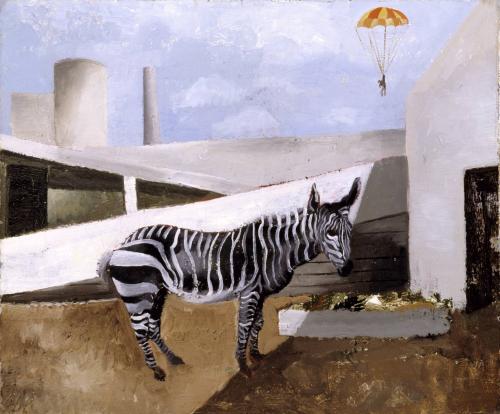
Zebra and Parachute
Christopher Wood
1930
_______________________
Zebra
John Latta
Isola di Rifiuti
(....)Where is the hiss of everyday life
A young painter at the Hermitage was copying Titian’s “Portrait of a Young Painter”
At the Peter-Paul Fortress sunners stood in the sun’s line of fire
Perfection
Then the young painter pulled a knife
Hillocks, tomatoes, flags, rocks, zebras, a feeling of weakness—the fact itself is at its limit
Nature is only some necessary addition to the city . . .
—
Lyn Hejinian, out of Oxota: A Short Russian Novel (1991)
(....)
Thin sheet-ice on Sloan’s lake
“dark white” shine, late February sun
Big red balloon tethered over Cub Food
winterpale shoppers, struggling with the load
like overweight ants dragging their take
away from an abandoned sandwich
A long ghost-white buick idles at the zebra
black glass, chrome gone, white tires
A deal in every aisle, every hour, every day
says a colossal signboard on the vast hanger . . .
— Edward Dorn, out of “Sketches from Edgewater”
...(more)
_______________________
The Landscapes of Border Resistance
Michelle Chen
Jacobin
(....)
As the blistery lower lip of the American Dream, the rim of desert connecting the U.S. and Mexico is where the nation’s deepest Hobbesian nightmares are projected daily, with headlines about “aliens” hopping the fence, traversing the desert, being brutalized by smugglers, and all manner of military-style security interventions — from buzzing surveillance drones to traffic checkpoints to border-patrol campaigns with names like “Gate Keeper” and “Hold the Line” (subtly evoking their infamous Eisenhower-era “Operation Wetback”).
The border-as-battleground lives on in the public imagination as a mash-up of the spaghetti western, Cops and CSI. It’s a final frontier, inscribed in the crawlspace between gritty reality and pure fiction: a construct of legal doctrine and geopolitical convention. It’s undergirded by nativist racial anxieties and both steeled and eroded by commercial forces that alternate between craving the free movement of capital and convulsing with fears of labor competition and unbridled markets.
The border’s fictional valence derives in part from the fact that it is the physical embodiment of a fantastically irrational immigration system. Today, immigration policy is a tangled mess of draconian green cards, family reunification waiting lists, asylum case law, and highly restrictive employment-based visa programs. And for all those who fall outside this thicket of statutes, they are labeled variously as undocumented, unlawful, irregular, or the loaded term of choice on the Right, “illegal.”
The border delineates an imagined geopolitical terrain —
(....)
Enter Immigrant X: an alternative universe of fictionalized anti-border renegades, the brainchild of a group of pseudonymous bloggers who operate as an imagined community of grassroots anti-border activists located in an unnamed “Western democracy.” The team includes a saboteur who works for the immigration authorities, along with a network of clandestine border resisters with anarchist leanings. Together they operate an underground railroad that liberates migrants from detention.
(....)
I recently spoke with Immigrant X from his location — somewhere in northern Europe — to talk about why social media and the online world might be an ideal arena for envisioning more militant resistance to borders and xenophobia. Though X did not want his actual name disclosed, he did reveal that he has been a humanitarian aid worker for over a decade, working in conflict zones in Africa and South Asia. His partners in the project are one fellow humanitarian worker as well as a third collaborator who “works in the immigration system.”...(more)
_______________________
Resistance, Rebellion, and Writing
Albert Camus's dispatches on the Algerian crisis appear in English for the first time
George Scialabba
bookforum
“People expect too much of writers,” Albert Camus lamented in the late 1950s. At the time Camus was writing, the Algerian rebellion had grown into a full-scale guerrilla war for independence, and while his initial sympathy for the uprising led the French Right and the French Algerian settlers to denounce him as a traitor, he also came in for frequent polemical attacks from the French Left for not energetically and unequivocally supporting the insurgents. Criticism also came from the Algerian militants themselves. Frantz Fanon, the best-known Algerian writer, derided him as a “sweet sister.” Sartre, formerly his close friend, mocked Camus’s “beautiful soul.”
Camus’s complaint does him credit. He agonized over his political pronouncements in a way that the more brilliant, mercurial, doctrinaire Sartre never had to. In 1957, as the war ground on and positions hardened on both sides, Camus was awarded the Nobel Prize for Literature. Despairing of the Algerian situation but determined to answer his critics and, with the prestige of the Nobel behind him, make one final effort for peace and reconciliation, Camus assembled a short collection of his writings about Algeria, which was published in 1958. It appears now in English for the first time, ably translated by Arthur Goldhammer.
...(more)
_______________________
Resistance versus Emancipation:
Foucault, Marcuse, Marx, and the Present Moment
Kevin Anderson
Logos
_______________________

Louisiana
c1971-74
William Eggleston
Master of colour William Eggleston wins Outstanding Contribution award
Shunned in the 60s as banal but now revered by everyone from David Lynch to Juergen Teller, this pioneer of disturbing colour photography to be honoured at Sony World Photography Awards
Sean O'Hagan
William Eggleston, whose colour photographs were dismissed as "banal" by critics when first exhibited at MoMA in New York in 1976, is to receive the Outstanding Contribution to Photography Award at this year's Sony World Photography Awards. Now recognised as one of the pioneers of colour photography, Eggleston, 73, has been named a major influence by maverick film-makers like Sofia Coppola and David Lynch, and younger photographers from Juergen Teller to Andreas Gursky. The British photographer, Martin Parr, once described him as "the supreme colourist of America photography."
_______________________
A Practical Utopian’s Guide to the Coming Collapse
David Graeber
an excerpt from The Democracy Project: A History, a Crisis, a Movement, by David Graeber
The Baffler No. 22
(....)
What is debt, after all, but the promise of future productivity? Saying that global debt levels keep rising is simply another way of saying that, as a collectivity, human beings are promising each other to produce an even greater volume of goods and services in the future than they are creating now. But even current levels are clearly unsustainable. They are precisely what’s destroying the planet, at an ever-increasing pace.
Even those running the system are reluctantly beginning to conclude that some kind of mass debt cancellation—some kind of jubilee—is inevitable. The real political struggle is going to be over the form that it takes. Well, isn’t the obvious thing to address both problems simultaneously? Why not a planetary debt cancellation, as broad as practically possible, followed by a mass reduction in working hours: a four-hour day, perhaps, or a guaranteed five-month vacation? This might not only save the planet but also (since it’s not like everyone would just be sitting around in their newfound hours of freedom) begin to change our basic conceptions of what value-creating labor might actually be.
Occupy was surely right not to make demands, but if I were to have to formulate one, that would be it. After all, this would be an attack on the dominant ideology at its very strongest points. The morality of debt and the morality of work are the most powerful ideological weapons in the hands of those running the current system. That’s why they cling to them even as they are effectively destroying everything else. It’s also why debt cancellation would make the perfect revolutionary demand.
...(more)
_______________________

Soleil, Tour, Aéroplane
1913
Robert Delaunay
b. April 12, 1885
_______________________
Twenty Little Poems That Could Save America
Imagining a renewed role for poetry in the national discourse — and a new canon
Tony Hoagland
(....)
It isn’t really fair to blame contemporary indifference to poetry on “Emperor of Ice-Cream.” Nor is it fair to blame Wallace Stevens himself, who also left us, after all, “Thirteen Ways of Looking at a Blackbird,” a poem that will continue to electrify and intrigue far more curious young minds than are anesthetized by a bad day of pedagogy on the Ice Cream Poem. Let us blame instead the stuffed shirts who took an hour to explain that poem in their classrooms, who chose it because it would need an explainer; pretentious ponderous ponderosas of professional professors will always be drawn to poems that require a priest.
Still, we have failed. The fierce life force of contemporary American poetry never made it through the metal detector of the public-school system. In the Seventies, our hopes seemed justified; those Simon and Garfunkel lyrics were being mimeographed and discussed by the skinny teacher with the sideburns, Mr. Ogilvy, who was dating the teacher with the miniskirt and the Joan Baez LPs (“Students, you can call me Brenda”). Armed with the poems of Lawrence Ferlinghetti and Richard Brautigan, fifteen-year-olds were writing their first Jim Morrison lyrics, their Kerouacian chants to existential night.
But it never took. We flunked. We backslid....(more)
_______________________
The Waste Land
John Beer
Ill. Ballad Of The Police Department
(....)
Sirens we were used to, but so early?
Through a window specked by last night’s rain,
I saw Wojohowicz give him the news,
then returned to my book: The Invention of Chance.
This is the song of atomic decay.
Contemporary fascination
with corporal preservation
recapitulates the ancient
ceremonies of atonement,
or so, at least, it seems to me,
as I lecture empty rooms
on F.H. Bradley and the moon.
Not the moon you lovers see,
the moon as it appears to me
and me alone, my eyes refined
by distillation in the mind.
My moon rains light through long night hours
awake within the prison tower
of internal experience,
the tower holding thief and prince,
stockbroker and the child of fame,
identically, but not the same.
One hears the scraping of the key.
One wishes one were one, not me.
...(more)
The Waste Land and Other Poems (2010) John Beer Canarium Books
_______________________
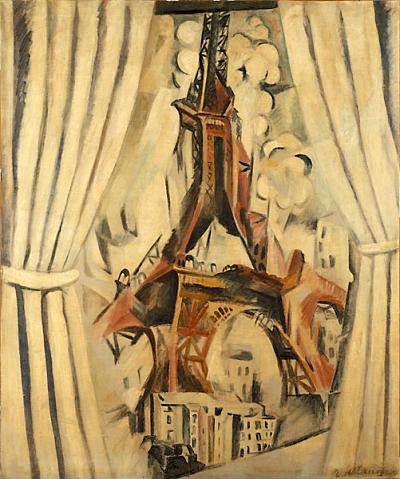
View over the Eiffel Tower
Robert Delaunay
1910
_______________________
The Pleasures and Pains of Coffee
Michelle Legro
Translated from the French by Robert Onopa
Lapham's Quarterly
(....)
Finally, I have discovered a horrible, rather brutal method that I recommend only to men of excessive vigor, men with thick black hair and skin covered with liver spots, men with big square hands and legs shaped like bowling pins. It is a question of using finely pulverized, dense coffee, cold and anhydrous, consumed on an empty stomach. This coffee falls into your stomach, a sack whose velvety interior is lined with tapestries of suckers and papillae. The coffee finds nothing else in the sack, and so it attacks these delicate and voluptuous linings; it acts like a food and demands digestive juices; it wrings and twists the stomach for these juices, appealing as a pythoness appeals to her god; it brutalizes these beautiful stomach linings as a wagon master abuses ponies; the plexus becomes inflamed; sparks shoot all the way up to the brain. From that moment on, everything becomes agitated. Ideas quick-march into motion like battalions of a grand army to its legendary fighting ground, and the battle rages. Memories charge in, bright flags on high; the cavalry of metaphor deploys with a magnificent gallop; the artillery of logic rushes up with clattering wagons and cartridges; on imagination's orders, sharpshooters sight and fire; forms and shapes and characters rear up; the paper is spread with ink—for the nightly labor begins and ends with torrents of this black water, as a battle opens and concludes with black powder.
I recommended this way of drinking coffee to a friend of mine, who absolutely wanted to finish a job promised for the next day: he thought he'd been poisoned and took to his bed, which he guarded like a married man. He was tall, blond, slender and had thinning hair; he apparently had a stomach of papier-mache. There has been, on my part, a failure of observation....(more)

The Fallen Tree
1951
John Nash
b. April 11, 1893
_______________________
Balibarism!
Bruce Robbins
n+1
At a debate in southern California in 2007, the French philosopher Alain Badiou informed the French philosopher Étienne Balibar that he, Balibar, was a reformist. “And you, monsieur,” Balibar replied, “are a theologian.”
Both of these epithets have more than a grain of truth to them. Both also say something, alas, about why Badiou, Rancičre, ˇi˛ek, and Hardt and Negri all sell better in America than Balibar. Reform sounds like a chore. But left-wing theology! That has an occult, revolutionary ring to it. In fact much of what passes for left-wing thinking in a country without an organized left is daydreams of the end of the world featuring mysterious, all-powerful messiahs?—?think of Hardt and Negri’s “multitude.” ˇi˛ek and Badiou operate at a higher level, but they too are drawn to scenarios in which Everything Is Suddenly and Utterly Changed. “Customers who bought these items have also bought Left Behind.”
(....)
Badiou, like many of his comrades, is a stylistic theologian: in his Ethics he does not hesitate to describe “Man” as “Immortal.” Balibar can write a forceful manifesto (see last summer’s declaration of solidarity with Greece, which Badiou also signed), but his irresistible attraction to parentheses and qualifications makes his philosophical writing sound reformist. His sentences are forever stopping to give credit to every thinker who might have had some hand in shaping his argument, especially thinkers who are not his ideological allies. Like a crosstown bus, he brakes at every conceptual intersection. Not for him the high road of careening, prophetic self-assertion. And how could it be, given his undisguised belief that existing political institutions are legitimate enough to be worth making demands on?—?not legitimate, but legitimate enough?
Enoughness of this sort is probably a more useful way of laying out the stakes in this argument than “revolution.”...(more)
_______________________
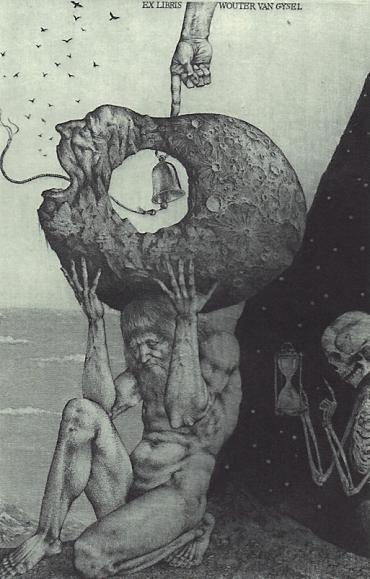
Ex Libris Mr. Reaper
Fifteen bookplates
from the collection of Richard Sica
50watts
_______________________
Resisting Resilience
Mark Neocleous
Radical Philosophy 178 (Mar/Apr 2013)
(....)
The beauty of the idea that resilience is what the world’s poor need is that it turns out to be something that the world’s poor already possess; all they require is a little training in how to realize it. Hence the motif of building, nurturing and developing that runs through so much of the IMF literature.
Resilience has been recognized by these organizations as a means of further pursuing an explicitly neoliberal agenda and has become one main way of managing the ‘disaster’ that is the global financial crisis. Not only is resilience increasingly coming to replace security in political discourse, then, but it is doing so by simultaneously becoming one of the key ideological tropes underpinning accumulation. And just as resilience is now the means for helping the poor become wealthy, so corporations are now in on the act, with ‘organizational resilience’ trumpeted and defended by the ‘International Consortium for Organizational Resilience’ (which runs a range of courses offering ‘certification’ in various aspects of resilience). Likewise, state officials very quickly resort to the theme as a mechanism for undermining anti-austerity actions.
This consolidation of ‘resilience’ during the current reunites state and capital by foregrounding a politics of anticipation. It also straddles the subjective as well as objective: systemic, organizational and political resilience is connected to personal resilience. Hence a theme of resilience as a personal attribute now dominates self-help books ... It is here that one finds the relationship between the economic development of neoliberal subjectivity and the political development of resilient citizenship. Resilience comes to form the basis of subjectively dealing with the uncertainty and instability of contemporary capitalism as well as the insecurity of the national security state. This is one reason human resources departments of large organizations such as universities are so interested in it. Good subjects will ‘survive and thrive in any situation’, they will ‘achieve balance’ across the several insecure and part-time jobs they have, ‘overcome life’s hurdles’ such as facing retirement without a pension to speak of, and just ‘bounce back’ from whatever life throws, whether it be cuts to benefits, wage freezes or global economic meltdown. Neoliberal citizenship is nothing if not a training in resilience as the new technology of the self: a training to withstand whatever crisis capital undergoes and whatever political measures the state carries out to save it.
This in turn explains two notable developments during the same period. The first is the growth of political ‘happiness agendas’ and official ‘happiness indices’. Resilience is central not only to the self-help industry, but also to the wider ‘happiness studies’ now being peddled by politicians and academic disciplines such as psychology and economics. The Journal of Happiness Studies was launched in 2000, and of the sixty-eight articles published since its launch that mention resilience, fifty have been published in the last five years. ‘Resilience is very, very important’ says Richard Layard, a leading figure of the new ‘Action for Happiness’ movement and now a British Lord for his work in the field. What might improve a nation’s happiness score? For Layard, it is ‘a programme in schools to build resilience among children’. Happiness is to become part of our resilience training; resilience is to be learnt as part of our happiness training....(more)
_______________________
The Loseable World: Resonance, Creativity, and Resilience
Lorri Neilsen Glenn
Essay and verse and anecdote are the ways I have chosen to apprentice myself to loss, grief, faith, memory, and the stories we use to tie and untie them. Cat's cradle, Celtic lines, bends and hitches are familiar: however, when I write about loss, I find there are knots I cannot tie or release, challenging both my imagination and my craft. Over the last decade, I have been learning that writing poetry is also the art of tying together light and dark, grief and joy, of grasping and releasing. Language is a hinge that connects us with the flesh of our experience; it is also residue, the ash of memory and imagination.
M/C Journal, Vol. 16, No. 1 (2013) - ' catastrophe'
_______________________
Hold Everything Dear: Dispatches on Survival and Resistance
John Berger
google books
_______________________
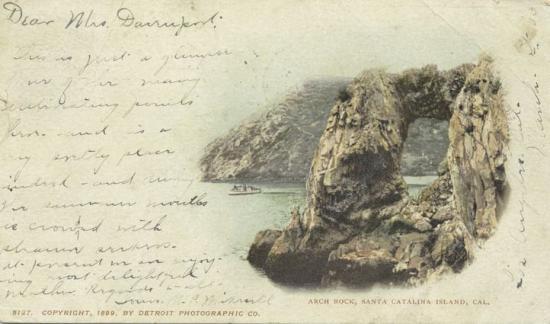
Arch Rock
Santa Catalina Island, Calif.
(1900-1902)
Detroit Publishing Company Postcards
from the Leonard Lauder Postcard Collection
NYPL Digital Gallery
_______________________
Too Much Sociology
the editors
n+1
(....)This spread of sociological thinking has led to sociological living?—?ways of thinking and seeing that are constructed in order to carry out, yet somehow escape, the relentless demystification sociology requires. Seeing art as a product, mere stuff, rather than a work, has become a sign of a good liberal (as opposed to bad elitist) state of mind. This is why you must support upper-middlebrow Terrence Malick one day, and the next spuriously shock everyone with a loud defense of Transformers: Dark of the Moon. Too often, being on the left tasks you with a vigilant daily quest to avoid being tagged with snobbery. In sociological living, we place value on those works or groups that seem most likely to force a reevaluation of an exclusive or oppressive order, or an order felt to be oppressive simply because exclusive. And yet despite this perpetual reevaluation of all values, the underlying social order seems unchanged; the sense of it all being a game not only persists, but hardens.
(....)
The danger is that the critical insights of what was called “critical sociology” have been repurposed as the status-quo thinking of “concerned liberalism”—the very thing that it set out to subvert. Thinking of everything as a scripted game show hasn’t led to change. Instead, sociological thinking has hypostatized and celebrated the script. Or to put it another way: hate the players, love the game. Even the sinister David Brooks managed to use (and only partly travesty) Bourdieu, when he suggested that the rise of “bourgeois bohemians” had largely solved the titanic conflicts of the Sixties. In such instances, sociology, which intended to explain in order to criticize the glacial stability of bourgeois society, has passed almost seamlessly into the hands of those wanting to justify that society.
...(more)
_______________________

Rocks and Sand Dunes
Oxwich Bay, South Wales
c.1939
John Nash
b. April 11, 1893
_______________________
An Obituary from Below
Richard Seymour
Jacobin
(....)
Thatcher’s most important achievements were also what made her so vile, and reprehensible. Her energy, her ruthlessness, and her political guile were harnessed to such bigoted, class-supremacist ends, that it is hard to admire them. Reviewing the wreckage of those years, it is difficult not to be transfixed by horror.
There is also the danger, in focusing on Thatcher’s qualities and successes, of overstating the role of an individual leader. Thatcher’s efforts depended not just on a wide coalition of popular and business interests, with the petty bourgeoisie and “new middle class” as its lynchpin, but on a series of institutional powers – from the popular press to the International Monetary Fund. Her strengths, as often as not, derived from her opponents’ weaknesses, divisions or downright cravenness.
Yet, there is no denying Thatcher’s leadership qualities. And this obituary will pay close attention to the factors that made Thatcher the most successful politician in the post-war period — in the spirit of learning from the enemy, the better to defeat them in future.
...(more)
_______________________
Thatcher: the PM who brought racism in from the cold
Daniel Trilling
_______________________
The Two Faces of Class Struggle
The Motor Force for Historical Regression or Advance
James Petras
_______________________

Arch Rock
Mackinac Island, Mich.
(1900-1902)
Detroit Publishing Company postcards
_______________________
City of New York settles with Occupy over destruction of the People’s Library
Claire Kelley
MOBYLIVES
The City of New York and Brookfield Properties has agreed to pay more than $233,000 to settle a lawsuit brought by Occupy Wall Street over the destruction of the People’s Library during the eviction of Zuccotti Park by the New York Police Department last fall. During the raid to clear the park in the early morning hours of November 15th 2011, the majority of the collection of more than 4,000 books donated by the public and organized by the Library Working Group was destroyed or damaged, an act roundly condemned by the American Library Association, as did the New York Civil Liberties Union and the National Lawyers Guild.
...(more)

Ben Nicholson
b. April 10, 1894
_______________________
The Inferno, Canto 1: Dante enters Hell
Dante Alighieri and Clive James
At the mid-point of the path through life, I found
Myself lost in a wood so dark, the way
Ahead was blotted out. The keening sound
I still make shows how hard it is to say
How harsh and bitter that place felt to me—
Merely to think of it renews the fear—
So bad that death by only a degree
Could possibly be worse. As you shall hear,
It led to good things too, eventually,
But there and then I saw no sign of those,
And can’t say even now how I had come
To be there, stunned and following my nose
Away from the straight path. And then, still numb
From pressure on the heart, still in a daze,
I stumbled on the threshold of a hill
Where trees no longer grew. ...(more)
.....................................................
How I Translated The Divine Comedy
An introduction to the beauty, variety, and drive of Dante’s epic poem—plus three cantos from The Inferno.
Clive James
adapted from the introduction of Clive James' new translation of The Divine Comedy, out now from Liveright
(....)
My translation of the Divine Comedy is here today because my wife, when we were together in Florence in the mid-1960s, a few years before we were married, taught me that the great secret of Dante’s masterpiece lay in the handling of the verse, which always moved forward even in the most intensely compressed of episodes. She proved this by answering my appeal to have the famous Paolo and Francesca episode in Inferno 5 explained to me from the original text. From various translators including Byron we can see what that passage says. But how did Dante say it? My wife said that the terza rima was only the outward sign of how the thing carried itself along, and that if you dug down into Dante’s expressiveness at the level of phonetic construction you would find an infinitely variable rhythmic pulse adaptable to anything he wanted to convey....(more)
_______________________

Standing Stones of Stennis
near Kirkwall, Orkney
Arthur Melville
(1858–1904)
_______________________
Mute Speech: Literature, Critical Theory, and Politics
Jacques Rancičre
with an introduction by Gabriel Rockhill and translated by James Swenson
google books
Let us return to the stone wall and refuge of silence. Blanchot, in fact, did not invent the metaphors he uses to celebrate the purity of literary experience, and the valorization of purity is not their only possible use. These same metaphors have often served to denounce the perversion inherent in that purity. They thus structure Sartre's arguments expressing both fascination and contempt for Flaubert and Mallarme. Sartre continually denounces Flaubert's infatuation with poems in dead languages, "words of stone falling from the lips of statues," or the Mallarmean poem's "column of silence blossoming alone in some secluded garden." He valorizes a literature of expository speech, in which the word serves as an intermediary between an author and a reader, in opposition to a literature in which the means becomes an end, in which speech is no longer the act of a subject but a mute soliloquy: "Language is present when someone speaks, otherwise it is dead words neatly arranged in a dictionary. These poems uttered by no one, which seem like bouquets of flowers or arrangements of jewels selected for their harmonizing colors, are in fact pure silence."' We might think that Sartre is responding to Blanchot and, therefore, quite naturally uses his vocabulary. But this critique of literary "petrification" has a much longer history. When Sartre denounces, from a political and revolutionary viewpoint, the sacrifice of human speech and action to the prestige of a petrified language, he paradoxically takes up the accusations that the literary and political traditionalists of the nineteenth century continually leveled against each generation of literary innovators. Whether in opposition to the images of Hugolian "Romanticism," the descriptions of Flaubertian "realism," or the arabesques of Mallarmean "symbolism," it was always the primacy of living and acting speech that the traditionalists upheld. In What is Literature?, Sartre sets up an opposition between a poetry that uses words intransitively, as a painter uses colors, and a literature that uses words to show and to prove. This opposition between an art that paints and an art that demonstrates was similarly already a leitmotiv of nineteenth-century criticism. It is the argument Charles de Remusat made against Hugo when he denounced a literature that "ceases to serve as the instrument of a fruitful idea and isolates itself from the causes it ought to defend [ . . . ] in order to become an art that is in dependent of anything it might express, a particular, sui generis power that looks only within itself for its life, its goals, and its glory." Barbey d'Aurevilly made the argument against Flaubert: the realist "only wants painterly books" and rejects "any book whose purpose is to prove something." Finally, this argument is also at the core of Leon Bloy's great denunciation of the ''literary idolatry'' that sacrifices the Verb to the cult of the sentence.' In order to understand this recurrent denunciation of literary "petrification" and its metamorphoses, we must thus break through the convenient barrier erected by Sartre between the pantheist naivety of the Romantic age, when "animals spoke and books were taken down directly from the lips of God," and the post -1848 disenchantment of disabused aesthetes. We must grasp this theme at its origin, in the very moment when the power of speech immanent in every living being and the power of life immanent in every stone are first affirmed.
Let us begin at the beginning, that is, the battle over "Romanticism."
(....)
pdf available at aaaaarg - free reg. req.
_______________________

Alfred Kubin
b. April 10, 1877
_______________________
The Air is Full of Our Cries: Samuel Beckett’s Voices
Mary P. Noonan
(....)
Nathalie Léger, in her book, Les Vies silencieuses de Samuel Beckett (Éditions Allia, 2006) quotes a friend who heard Beckett remark that what he liked about the radio version of Marguerite Duras’s play Le Square, was “les petits pātés de sable des voix, des timbres, placés tantōt ą terre, tantōt dans l’espace” (“the little sandcastles of voices, of timbres, sometimes placed on the ground, sometimes in space”). What Beckett was drawn to in this production was the effect of deracinated voices coming out of the dark, unencumbered by the trappings of character. This was his desire for his own theatre: that it represent the movement of voices inside and outside the skull, an indeterminate space where the spectator is never sure if she is on the inside, imagining, or on the outside, seeing and hearing. Words were, for Beckett, a necessary stain upon the silence. “I don’t find solitude agonizing,” he once said to Nancy Cunard, “holes open up in paper and take me fathoms from anywhere.” Representation of these fathoms, of the compulsion to tear open the silence, to draw the auditor/spectator into the vastness separating thought from its objects, was perhaps his primary aim for his theatre. The space between is filled with voices, particles of dust moving in air: “I am all these words, all these strangers, this dust of words, with no ground for their settling” (The Unnamable). If the self exists at all, it is in the mobile processes of language that it is to be located.
Beckett’s work for the stage was a continuation of his prose project: an exploration of the mystery of the voice — it origin, its location and its nature, whether a marker of discrete essential identity or a cultural echo, the voice of the speaking subject or the point of intersection of “all the dead voices.” ...(more)
Cerise Press Vol. 4 Issue 12
_______________________

Mousehole
Ben Nicholson
1947
_______________________
Axial Class Struggle
An Interpretation of Immanuel Wallerstein’s Vision
Harry J. Bentham
(....)
An accurate class struggle concept must consider the fact that the world is an integrated social system. It does not have to be considered as divided into workers and capitalists, but instead it includes the entire spectrum of people from corporate executives and regime leaders in Western states to the very poorest and most violated people of the world living perhaps in Haiti, Palestine and Afghanistan. Although not intending to be concretely accurate, these are possible representations of the two ends of the spectrum we are dealing with, and they help suggest the value of Wallersteinian theory concerning the vast inequality that separates the world’s people geographically into oppressors and oppressed. If those two camps can be understood through a global narrative, the narrative is represented in Wallerstein’s theoretical works.
The “axial division of labor” is really the nexus of Wallerstein’s analysis of the world system, and that nexus is the source of its injustices. The axial division of labor provides the rationalization of the primary structural inequality in the world, and all the other smaller inequalities that are ultimately ideologically linked to the same rationalization. The axial division of labor repeatedly lends the structural requirements for the main inequality of the North and South, the developed and underdeveloped regions.
(....)
Although there is a significant departure from Old Left ideas and Marxist orthodoxy in the interpretations voiced in this essay, the Wallersteinian view does not necessarily seek to discredit groups and ideologies but would prefer to convince them to look upon the global social system with different emphases. Of these emphases, the greatest is placed on the oppression of the vast impoverished poor zones of the world economy and society. Although defense of minorities and women are also of great emphasis in the Wallersteinian line of thought, nothing could demand greater attention than the reality that the richer locales and states in the world economy are constantly exploiting and defrauding the vast majority of the world population. That class relation is what should be the primary target for criticism and action by people who newly consider the many and diverse New Left ideas rather than continuing to pursue an Old Left doctrine.
...(more)
Dissident Voice_______________________

Ben Nicholson

Photo by Erik Calonius
May 1973
Messages from the Underground
Tom Clark
It's unnatural to man
to go down among the dead
in the light of lost worlds. ...
...(more)
_______________________
(....)
When england was the whore of the world
Margeret was her madam
And the future looked as bright and as clear as
The black tarmacadam
Well I hope that she sleeps well at night, isnt
Haunted by every tiny detail
Cos when she held that lovely face in her hands
All she thought of was betrayal
Elvis Costello, Tramp The Dirt Down Lyrics via Eliot Gelwan (Follow Me Here...)
Margaret Thatcher and misapplied death etiquette
The dictate that one 'not speak ill of the dead' is (at best) appropriate for private individuals, not influential public figures
Glenn Greenwald
Thatcher’s Legacy of Failed PrivatizationsMichael Hudson
The Queen Mother of Global Austerity and Financialization
Michael Hudson and Jeffrey Sommers
Margaret Thatcher is dead. Her policies as prime minister ruined the lives of millions of people. Now her political heirs are trying to extend the damage she did in ways she only dreamed of.
The great political task before all of us is to ensure they fail. We need to make sure Thatcher's legacy dies with her.
—
Alex Snowdon
_______________________
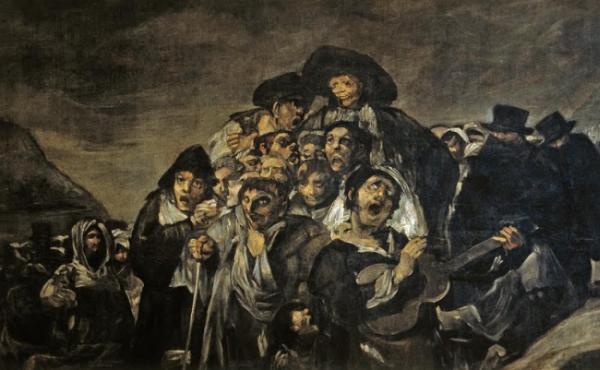
Pilgrimage to the Hermitage of St. Isidore
1819-23
detail
Goya
_______________________
Robert Gibbons: four poems newly sighted
presented by Jerome Rothenberg
Writing on Goya
One doesn’t simply run head-on into Goya snorting some interpretation, or other. Nor stroll through the gallery of history as Nietzsche warns against in his Untimely Meditations without suffering life from the ground up. Rather, run gauntlet. Fight against one’s Time. I’m not gazing at any specific work, but Goya’s vicious brushstrokes, fierce blacks, penetrating vortexes, barely audible grunts & barks as titles swirl, hurt brain & viscera, make black blood blue. To get to Goya is to go through Lorca through Guernica through gore of bull & sword, peasant & starvation, through that which is unimaginably worse. One doesn’t simply say rape, torture, mutilation without potential disastrous ramification, but blood is in the veins till running from gash & wound into the ground, when Death grants another pardon in order to lift pen, & crack voice open as vessel. Stark, raving, angered at injustice, typing on the keyboard till fingerprints are raw, then gone.
...(more)
_______________________
Deleuze, Occupy, and the Actuality of Revolution [pdf]
Thomas Nail
Theory & Event Volume 16, Issue 1, 2013
Abstract
While the philosophical idea of the return of revolution is becoming increasingly more popular and relevant today, the current body of literature thinking through it has tended to under-theorize and often neglect a crucial dimension of this return: the actuality of the revolution itself. This paper argues that we can locate a supplement to this problem in Deleuze and Guattari’s constructivist political analysis. In particular, this paper demonstrates how Deleuze and Guattari’s political analysis can help us illuminate the actuality of one of the most interesting revolutionary movements underway today: the Occupy movement.
_______________________

Government Bureau
(1956)
George Tooker
1920 - 2011
_______________________
Compression and Oppression
Robert Kerr
ctheory
Compression, at the best of times, softens the blow. It is, however, defined by the force of its misuse, a military grade weapon used to enhance the audio-virological power of sonic capital. It is nothing more than the stifling of dynamic range in the hyper-competitive economy of attention. It is where nuance, that cultural pocket of whispers, of silences, no longer exists because it is dragged up to compete with the rest of the sky-scraping peaks, where, if something decides to cross the set threshold (which can be changed at any given time), it is forced to back down in order to fit within the general wall of sound. If such singular entities are not complicit with this process then they are edited out as non-desirables through non-destructive editing, [4] the process where one can redeem oneself from his or her past mistakes by changing historical commands to suit oneself at a keystroke (at the speed of light). The compressor is the machinery of the noise war, but to Castro the music was louder than war. Is this, however, a compliment? Or did he mean that the noise of the music itself was nothing but the assimilating mask to the protest against the injustice of globalisation, a theme tune to the tragedy of dying silence? Or was he simply poking fun at Western music? Should one not feel tortured, as Adorno felt, by the hypocrisy of those commodified, homogenized assimilations of dynamic political participation? What does this noise do to those who subject themselves to it? Is it a shock to thought, or a provocation to boredom?
Compression is also the governor of the geography of nowhere, the condensed space where one can't move without being BOMBARDED with the excess of signs, resulting in hyper-stimulation towards consumer fetishism and complicity to the system in which one thinks they are rebelling against. It is the barrier, the oppression of dynamic activism, of dynamic protest. It is the unnecessary permission needed to move in public areas owned by private companies. It is the demand for certain conducts of behaviour on pain of a lengthy jail sentence, on pain of death in some other destinations -- it is the police escort who marches the marchers trying to stand up against such tyranny. It is the entire system of law. Compression condenses dynamic cultures by assimilating them in the name of globalisation, where everyone is screaming yet not one person is heard. It is the squeezer of small businesses in niche communities who have no choice, through the force of globalisation, to adapt to the VOLUME of global industry, losing all identity, losing their own unique singularities, and becoming an extension of the greater.
...(more)
_______________________

Conspiracy
Camera Work XXIX, 1910
George Seeley
1880-1955
via
1 2 3
Camera Work: A Pictorial Guide With Reproductions of All 559 Illustrations and Plates, Fully Indexed
google books
The fifty numbers of this famous and lavishly illustrated periodical, which he [Alfred Stieglitz] edited and published between the years 1903 and 1917, contained some of the finest examples of photography and modernist art.
_______________________
Architectural Absence
an abecedary
Monica Datta
conjunctions
Deconstructivism
An analytic approach to architecture suggesting that meaning depends on the arbitrary, because it does.
Gregory became associate director of the Briggs-Crenshaw Gallery after two years as an assistant and an MA from the Slade. His first exhibition was the architect Jacques Dutronc, notorious for his use of stained glass; they had designed a large pavilion approximating the shape of a swan, with broken-shard plumes and feathers. The engineers were an older man who spoke very slowly, and a bored, belligerent girl.
“We want to shock them,” explained Dutronc. “We want to be very … polémique.”
“OK,” said the girl. “How tall is the space?”
“It would be very edgy to break up the glass,” said Gregory.
“OK,” said the girl. “How tall is the space?”
“Would it not be formidable to suspend the globes exactly at the level of the eye?” asked Dutronc.
“OK,” said the girl. “How tall is the space?”
“Swan’s eggs,” said Gregory.
“And they will break!” Dutronc exclaimed, delighted.
...(more)
_______________________

14th-century French bronze
Phyllis riding Aristotle
a flickr set
.....................................................
Phyllis Rides Aristotle
Justin Erik Halldór Smith
(....)
The figure of Phyllis riding Aristotle begins to appear at the moment when Aristotle is beginning his slow decline as the preeminent representative of philosophy, as 'the Philosopher'. Several more centuries would follow in which celibacy would function as the norm and implicit ideal among philosophers. Against this background, it seems to me that much of the trouble philosophy as an academic discipline is currently having in the matter of gender equity has to do not just with its legacy of macho grandstanding, the old-boys'-club sense of entitlement that so many of its cocky male practitioners have, etc., but also, at least in part, with the fact that the discipline has its deep historical roots in something akin to monasticism, a commitment whose demise Nietzsche seems to be bemoaning, where the boys' club is constituted not on the basis of a shared commitment to prowling, lecherous domination of women, but rather to an ideal of separateness.
...(more)
_______________________
The Making of Originals: The Translator as Editor (Part 1) and 2
Karen Emmerich
words without borders
And it’s not just ancient works that present us with difficulties of this sort. What, after all, do we translate when we translate an unfinished novel by Franz Kafka, or the poems of Emily Dickinson, bristling with variants? If works such as these have sparked scholarly debate concerning how they should be presented even within the language of their “original” composition, how does the added layer of translation complicate these discussions? If translation and editing are, again in André Lefevere’s terms, both forms of “rewriting” that mediate readers’ encounters with works of literature, might it make sense, at least under certain circumstances, to think of translation as editing of a certain kind?
My answer to this question—an emphatic yes—is undoubtedly colored by my own experiences translating unstable originals....(more)
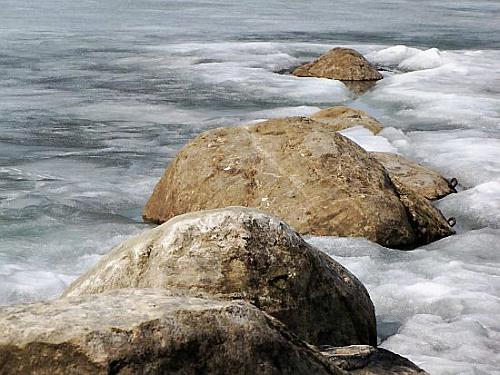
photo - mw
_______________________
North Of Invention: A Canadian Poetry Festival
January 2011
A. Rawlings • Fred Wah • Christian Bök • M. Nourbese Philip • Stephen Collis • Nicole Brossard • Jeff Derksen • Jordan Scott • Adeena Karasick • Lisa Robertson
North of inventionresponeses to the festival curated by Sarah Dowling ... as with any conference or festival, our main regret was that our imaginations had to be constrained by the cold, hard practicalities of organizing an international event. In the months that followed, however, we began to hear from people who had watched our webcast, from teachers and professors who were using the PennSound videos of the festival in their classes, and from local writers who had been inspired by the performances they had seen. We came to view this online activity as an opportunity to extend North of Invention, an opportunity to overcome some of the limitations that a live event necessitates. We devised the idea of asking a number of writers to respond to the videos of the readings and performances. These new responses, we hoped, would continue the dialogue on North American poetics begun at the festival.
.....................................................
Responding to Fred Wah
Christine Stewart
January 20, 2011, at North of Invention: A Canadian Poetry Festival, Fred Wah disturbs Canada's national imaginary.
In his talk, in the Kelly Writers House, in Philadelphia, USA, Wah describes his poetic practice as a kind of grammatical GPS that locates and disturbs the Canadian national imaginary. Formed by his experience as a person of Chinese, Scottish, and Swedish descent, Wah pays close poetic attention to the minute and overlooked in language, identifying and troubling coercive nationalistic narratives. In doing so, he practices an “alien ethnic poetics” that “locates a time and space outside and between what is signified on the nation’s surface.”
Demonstrating his poetic system of location, Wah considers the preposition “from,” in the national slogan, “from sea to sea,” reminding us that to be from Canada is to not be from Canada — it is to be from elsewhere. Recalling the Canadian government’s Chinese Exclusion Act [1], and the federal legislation that made it illegal for Indigenous people to vote until 1960, Wah locates Canada as a country founded on racist immigration policies, and a brutal and bureaucratic process of colonization.
And these are accurate coordinates. In fact, since Canada is a country based on the illegal annexation of the traditional lands of hundreds of Indigenous nations, even the communities that are actually from here (and have always been here) are not from that Canadian here.
Wah identifies his poetics and Jeff Derksen’s “public language” as interventions into this national imaginary. As is evident by the critical intensity of Wah and Derksen’s work, Canada has always been deeply invested in its own imaginary delineations; Canada has never been north of invention....(more)
_______________________

Boat in Harbour, Brittany
1929
Christopher Wood
(7 April 1901 - 21 August 1930)
_______________________
What do you mean by 'class'?
Richard Seymour
(....)
Is it time to throw conventional class dogmas aside? The BBC, which has just published a detailed survey of social class in the United Kingdom , produced by academics at the London School of Economics and the University of Manchester, says it is.
(....)
The survey reaches a bold conclusion: the traditional tripartite division of people into working, middle and ruling classes has eroded. The "traditional" working and middle classes account for a mere 39% of the population. The new classes include the "precariat", or precarious workers; emerging service workers; new affluent workers; and the technical middle class.
This is the sociologist's dream: a stale, simplistic schema giving way to a more novel and complex understanding. However, these findings aren't quite as groundbreaking as they would seem to be.
(....)
... by employing a radical class analysis, "austerity" can be seen as a political class strategy for redistributing the social product and consolidating the wider political and ideological power of the rich. This is not just a matter of interpretation: it is strategic, for it explains the doggedness of their clinging to policies that "don't work", and also calls into question what sort of class capacities and strategies we could activate in opposing "austerity".
This is what is at stake in class analysis today....(more)
via Jodi Dean
_______________________
The BBC Class Calculator: “like they left some bourdieu out in the sun and it went off”
Alice
new left project
I can see what they are trying to do, and was really drawn in by bits of the paper (really, do read it). They expand the vocabulary of class and do so in a way which reflects something of the diversity and changes in modern Britain. It offered a lot more realistic blurring and fluidly than we're always offered in such taxonomies. It also showed the role of culture, and that it is possible to be economically successful with relatively few social connections. But Bourdieu offered us these symbolic capitals to look at the way social inequalities were expressed, established, exchanged, maintained, replicated and accumulated even in places where money didn’t seem to be a dominant force. In comparison, this new study seems to use them very passively to describe, almost using the focus on culture to obscure economic differences. As one of those social and emerging cultural capital expressing Twitter users put it: “it's like they left some Bourdieu out in the sun and it went off”.
The Great British class calculator: What class are you?
A New Model of Social Class:
Findings from the BBC’s Great British Class Survey Experiment _______________________
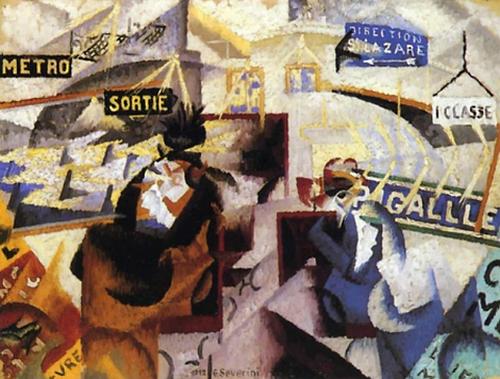
The north-south
Gino Severini
b. April 7, 1883
_______________________
"The best people possess a feeling for beauty, the courage to take risks, the discipline to tell the truth, the capacity for sacrifice. Ironically, their virtues make them vulnerable; they are often wounded, sometimes destroyed."
- Ernest Hemingway
Popular Complacency in an Era of Economic Exploitation and Perpetual War Phil Rockstroh
(....)
A tyranny of the reasonable is in place under corporate hegemony, in which the unique and unruly nature of human character is deemed inappropriate to a workplace environment — an outright affront to the “team player” esprit de corps of the corporate state. Thus, those adapted to embodying the lie inherent to living a superficial life are considered a company asset (until, of course, perennial rounds of downsizing begin) while truth-tellers carry qualities of the chronically unemployable, and whistleblowers become objects for federal prosecution.
Yet, there is a place, an indomitable domain within you that allows you to live with truth…that allows you to live so deeply within your authentic nature that you can live beyond yourself. Finding this place is crucial: For if you cannot bear what is true (often uncomfortably so) about yourself, it is impossible to discern the true nature of others.
Consequently, life is reduced to a series of provisional deceits. The ability to love becomes atrophied. The world becomes a prison constructed of petrified longing and misapplied aggression. One falls easy prey to peddlers of false hope and propagandists who promote wars based on lies.
In contrast, it is essential to maintain a sanctuary within where shame cannot trespass — where your luminous (but inhuman) daimon is allowed rendezvous with transitory, mortal longing — where the daimon’s outrageous demands cross-pollinate with grim, earth-shackled realities, thus allowing for not only the bloom of radiant possibility but the ability to apprehend a self-serving lie and nip it in the bud.
...(more)
_______________________

Tréboul
Christopher Wood
1930
_______________________
Aesthetic Tendency and the Politics of Poetry [pdf]
Ron Silliman, Carla Harryman, Lyn Hejinian, Steve Benson,
Bob Perelman, Barrett Watten
(Originally published in Social Text 19/20 (1987); this text was established by
Steve Benson in 2013 from original manuscripts and contemporary
correspondence.)
_______________________
Class Warfare, Anarchy and the Future Society:
Is the Middle Class forging a Gramscian Counter-Hegemonic Bloc Worldwide?
What are the Implications?
Mathew Maavak
Abstract:
This paper analyses the mechanics and ramifications of a rise in social agitations worldwide. It combines pertinent scholarly works, anecdotes and contemporary news reports to inquire whether the global middle class is consolidating to lead a mass-based revolt within societies – as well as the ensuing implications. The case will be made that middle classes worldwide are forming an embryonic counter-hegemonic bloc against the accumulation of power and wealth by the so-called “privileged 1%.” Certain neo-Marxist scholarship have been studied and applied to understand the forces of revolt today.
_______________________
Not against expression
Gregory Betts
Shortly after North of Invention, I had the opportunity to ask M. NourbeSe Philip a question following her public reading here in St. Catharines, Ontario. She read exclusively from Zong!, outlining for a group of mostly students (the same students featured in the chapbook she holds up towards the end of the video) the difficulty of writing about eighteenth century African slaves who were murdered for the sake of an insurance payout.
My question, drawing upon her repeated desire to “tell the story that cannot be told,” was simple: “Are you ‘against expression’?”
Her answer was not simple: “No.”
Being not-against expression does not automatically make one for expression. The negation opens up a gap in what is sayable, a liminal space in which, to paraphrase Lisa Robertson, the possible fusion of politics and emotion provokes a literary opening for the recollection of the dead. The dead themselves are absolute negation, perfect absence. We remember and reconstruct them through the trace they leave, and what the living choose to preserve. When the dead in question have been written out of history, with almost all trace destroyed or else reclaimed by the earth, it is only through an act not-against expression that one can recall them into the literary.
Recollection is a noun of action from the Latin recolligere meaning the act of recalling to memory: in this case, to bring back by calling upon an absence. This is very much a literary problem for an author in a country where, when she began writing “there didn’t appear to be a tradition of writing by people like myself.” This place outside was “open” and “silent” but it was out of that space that Zong! was written: “how difficult it has been to speak silence, to read silence.” Recognizing her position as a writer outside of the expressible and the expressed, she has consistently situated herself on the other side of the borders of literary power (though willing to come over, nervously and with a feeling of “prickliness,” to get work)....(more)
NourbeSe Reads from Zong! youtube
Sina Queyras on M. NourbeSe Philip’s Zong!
Reading M. NourbeSe Philip's 'Zong!'Fred Wah .....................................................
M. NourbeSe Philip reads "Discourse on the Logic of Language"
M. NourbeSe Philip reads "Set Speaks Again About Coffee"
_______________________

photo - mw
_______________________
Speaking together against the fixed
Lisa Robertson on poetry as citizenship
Melanie Bell reporting on Lisa Roberton's presentation at North of Invention
What constitutes poetry, and how might it serve as a vital, even undeniably necessary act of citizenship? In her address to the North of Invention audience, Lisa Robertson eloquently addresses these questions while discussing the inextricability of subjectivity, social relations, and language. Her talk, one incarnation of a still-evolving paper initially presented at a conference on citizenship, invokes the ideas of French linguist Emile Benveniste. Benveniste tracks institutional change — in its broadest sense, encompassing speech and other socio-cultural institutions as well as the actions integral to them such as buying, siring, and hosting — through the permutations of language, thus rendering such changes transparent. For Benveniste, language, as medium in which change is recorded, stands as an argument against institutions’ tendency towards fixity....(more)
_______________________
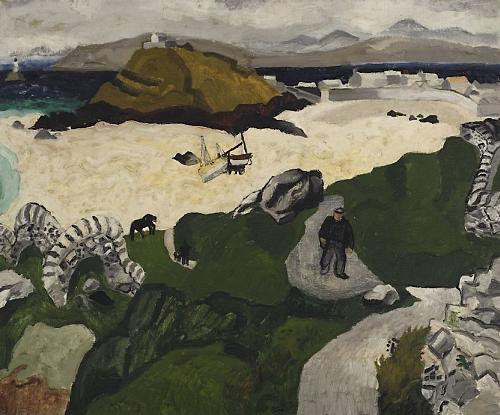
Porthmeor Beach
Christopher Wood
1928
_______________________
Two New Poems
Anthony Thwaite
On Tharston Bridge
Water under the bridge-dead metaphor
Lifted from somewhere, left to lie
Stiff on the page. Yet now it comes to life
Simply by being written down, repeated
Like something in the liturgy, words chanted
And echoing down the old cold labyrinths.
I pick them up and warm them on my tongue
Bringing back all that happened long ago
And flowed away, yet also can be seen
Far down under the parapets, going on,
Not to be stopped or hindered, staying there
In bits and pieces, shatterings and sherds,
Not to be joined together and made whole
But water under the bridge, still flowing on.
...(more)
Standpoint

The Falls of Niagara
ca. 1825
Edward Hicks
b. April 4, 1780
_______________________
Affective labour (pt1)
Angela Mitropoulos
s0metim3s
(....)
... oikonomia legitimates the distribution of surplus labour, orders the excesses of affection, allocating its sources and objects. It is, then, not a matter of reinstating a ‘work-life balance,’ inasmuch as that restoration might be tacitly understood as or, in practice, entail the return of (largely) women’s time to unpaid domestic work and the reproduction of life.
Nor would it be a matter of denouncing the enslavement that is implied by the indistinction of worktime and that of life, as if unpaid and poorly paid labour has not always been the precondition of the circumscribed ‘normal working day.’ The expansion of precarious work, the increasingly widespread predicament of infinite worktime that has overtaken the demarcations between life and labour need not play out, once again, as the naturalised allocation of surplus labour along oikonomic lines.
Nevertheless, given the indistinction between worktime and the time of life, the question of how workers might take (what might be redundantly referred to as) industrial action becomes both more difficult to answer and all the more pressing. To be sure, there is a more complex story to be told about both affective labour and precarious work, not least because these are hardly new, even if they are new experiences for some; and even as they emerge as novel motifs in social analysis, likely because (over the last two decades) these forms of work have come to impact upon the experience of work for white, middle class men in metropolitan countries.
Still, the question of what to do when the strike becomes structurally implausible, when workers are spatially and temporally disaggregated, or when the work contract is both precarious and infinite in its reach, becomes a more pertinent one for all that. Given the pertinence of (faking) affective attachment, what becomes increasingly troubling is the uncanniness of robotic feeling.
...(more)
Oikonomia
_______________________

photo - mw
_______________________
When the Winter Ghosts Depart
Steve Klepetar
They leave slowly, as if reluctant to go
or unsure when the time is right, like travelers
who can’t decide which books to pack, the long
Russian novel they’ve been struggling to finish
or the new one about cerebral werewolves, its firm hard binding
bright on the shelf promising a new kind
of death.
Where ice has leeched deep down into soil, they move
slowly, wading through dirt and loosened stones
but where the symphony of roots has bound them
in a coil of growth they hesitate, caught
up in the coming storm of leaf and branch and flower.
Sometimes they slip away
in pairs, lovers
from an old film, long, gray coats and a fedora
slanting out into sullen wind.
...(more)
From the Depths
... A Story Will Rise
Haunted Waters Press
_______________________

Cherry
(1914)
Emil Filla
b. April 4, 188
_______________________
The most dramatic shift: we’ve lost the expectation that they would be interoperable. The Web was built out of interoperability. “This went away with almost no public discourse about the implications of it.”
Anil Dash on “The Web We Lost”
a Berkman lunchtime talk live-blogged by David Weinberger
(....)
“This is actually a battle” against the values of the early Web. In the mid to late 1990s, the social Web arose. There was a time when it was meaningful thing to say that you’re a blogger. It was distinctive. Now being introduced as a blogger “is a little bit like being introduced as an emailer.” “No one’s a Facebooker.” The idea that there was a culture with shared values has been dismantled.
(....)
Less visibly, the laws is being bent “to make our controlling our data illegal.” All the social networks operate as common carriers — neutral substrates — except when it comes to monetizing. ...
(....)
A decade ago, metadata was all the rage among the geeks. You could tag, geo-tag, or machine-tag Flickr photos. Flickr is from the old community. That’s why you can still do Creative Commons searches at Flickr. But you can’t on Instagram. They don’t care about metadata. From an end-user point of view, RSS is out of favor. The new companies are not investing in creating metadata to make their work discoverable and shareable.
(....)
We built the Web for pages, but increasingly we're moving from pages to streams (most recently-updated on top, generally), on our phones but also on bigger screens. Sites that were pages have become streams. E.g., YouTube and Yahoo. These streams feel like apps, not pages. Our arrogance keeps us thinking that the Web is still about pages. Nope. The percentage of time we spend online looking at streams is rapidly increasing. It is already dominant. This is important because these streams are controlled access. The host controls how we experience the content. "This is part of how they're controlling the conversation." No Open Web advocate has created a stream that's anywhere near as popular as the sites we're going to. The geeks tend to fight the last battle. "Let's make an open source version of the current thing." Instead, geeks need to think about creating a new kind of stream. People never switch to more open apps. (Anil says Firefox was an exception.)
...(more)
_______________________

Emil Filla
_______________________
The enduring emptiness of our technology debates has one main cause, and his name is Tim O’Reilly.
The Meme Hustler
Tim O’Reilly’s crazy talk
Evgeny Morozov the baffler
(....)
... to fixate on technological innovation alone is to miss the more subtle—and more consequential—ways in which a clique of techno-entrepreneurs has hijacked our language and, with it, our reason. In the last decade or so, Silicon Valley has triggered its own wave of linguistic innovation, a wave so massive that a completely new way to analyze and describe the world—a silicon mentality of sorts—has emerged in its wake. The old language has been rendered useless; our pre-Internet vocabulary, we are told, needs an upgrade.
Fortunately, Silicon Valley, that never-drying well of shoddy concepts and dubious paradigms—from wiki-everything to i-something, from e-nothing to open-anything—is ready to help. Like a good priest, it’s always there to console us with the promise of a better future, a glitzier roadmap, a sleeker vocabulary.
...(more)
_______________________
Rage Against the Machine
A digital heretic decries the spread of "solutionism"
Siva Vaidhyanathan reviews To Save Everything, Click Here by Evgeny Morozov
bookforum
_______________________

Fishing Port
1911
Maurice de Vlaminck
b. April 4, 1876
_______________________
The Internet, Capitalism, and the State
A Review of Robert McChesney's "Digital Disconnect"
Joshua Sperber
counterpunch
(....)
Through “targeted advertising,” “persuasion profiling,” “sentiment analysis,” and “commercializing friendship” (a specialty of Facebook, which uses users’ “likes” to sell products to one’s “friends”), online advertising has radically expanded the intensity and intimacy with which media consumers are commodified. As Bruce Schneier notes, ‘“Google has great customer service. Problem is, you’re not the customer.’”
(....)
Notwithstanding the book’s clearly written tour of numerous issues characterizing today’s internet, from the effective demise of net neutrality via Smartphones to the multiplication of cloud computing, McChesney’s account is diminished by a dubious conception of the state that leads to an inadequate analysis of capitalism and, thereby, a flawed prescription.
(....)
McChesney’s focus on internet commercialism and personal data collection is important, but this consumerist orientation leads him to overlook one of the biggest stories of the internet under capitalism: the proliferation of unpaid social production. The internet has masterfully channeled users’ “free time” toward “hobbies” that produce websites’ content. Facebook and dating sites are of course mainly composed of users’ photos, personal descriptions, commentary, and musings. Similarly, the owners of Yelp have made a fortune via the unpaid restaurant reviews of its millions of contributors, who simultaneously serve to discipline restaurant workers (for free!) via consumerist ideology. Online newspapers and sports sites have become far more interesting by soliciting readers’ comments, whose frequent thoughtfulness, wit, and learnedness often provide more compelling reading than the original content. So not only are we being advertised to and having our personal data taken while we’re on the internet, we’re also working for free to make sure that there’s an internet at all. Through such personally intensive and infinite productivity, the internet has opened whole new spatial and temporal arenas for profit, not only through the radically increased shadow work of maintaining our online networks and bringing work home with us – which McChesney briefly addresses – but also through redefining how we conceptualize our relationship to social reality itself.
...(more)
How Capitalism Conquered the InternetExcerpted and adapted with permission from Digital Disconnect: How Capitalism is Turning the Internet Against Democracy (New Press) by Robert McChesney.
_______________________

La Meule
1905
Antonin Personnaz
1854 - 1936
_______________________
"Preferring Not To" in the Age of Occupy
Work and Idleness in the Age of the Great Recession
Jac Asher
social text

The Timid Proud One
Asger Jorn
1957 _______________________
The Three Events Of Philosophy
Slavoj Žižek
“I don't much like hearing that we have gone beyond Hegel, the way one
hears we have gone beyond Descartes. We go beyond everything and
always end up in the same place."
This apercu by Lacan can serve as our guiding principle: beware of all too easy attempts at “overcoming” metaphysics! There are three (and only three) key philosophers in the history of (Western) metaphysics: Plato, Descartes, Hegel. The proof of their privileged status is their extra-ordinary position in the series of philosophers: each of the three not only designates a clear break with the past, but also casts his long shadow on the thinkers who follow him – they can all be conceived as a series of negations/oppositions of/to his position. It was already Foucault who noted that the entire history of Western philosophy can be defined as the history of rejections of Platonism: in a homologous way, the entire modern philosophy can be conceived as the history of rejections of Cartesianism, from subtle corrections (Malebranche, Spinoza) to outright dismissals. With Hegel, things are, if anything, even more obvious: what united all that comes after Hegel is the opposition to the specter of Hegel’s “panlogicism.”
...(more)
_______________________
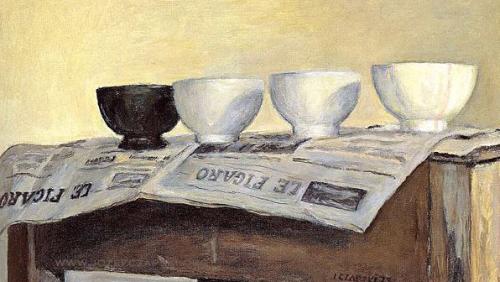
Le Figaro
1978
Józef Czapski
b. April 3, 1896
_______________________
Downton Abbey and the Fantasy of Structured Idleness
Karen Tongson
social text
Volunteerism, a sense of common duty, a spirit of national service, indeed, "hope" itself, coaxed us ever-so-briefly from the ruins of several ignominious wars and a Great Recession, only to send us scurrying back for cover, retreating to the comfort of our disenchantment. Conversely, some of us found ourselves careening headfirst into the fray in search of our own oblivion. This time, you see, the Empire was no longer in its arc of ascent (was it really ever?), but plunging downward in its inevitable decline.
It is in this atmosphere of precarity, decline, nay ruin, that our popular amusements once again take on a special significance. Cultural observers have marveled at the American appetite for depictions of obscene wealth and privilege, especially during "hard times." In the 1980s, Dallas, Dynasty and Falcon Crest enabled us to sit around and wonder what "royal" folk American-style--i.e. oil barons and wine matriarchs--would do. Thirty years later, we've gone back to Britain and a venerable old estate called Downton Abbey for our prurient speculations about the rich and idle. Surely the Downton phenomenon can be distinguished from these gaudier 80s baubles of televisual escapism for a whole host of reasons....
(....)
As a recovering Victorianist, I could go on at length about the gendered implications of primogeniture in Downton Abbey, and the fortune-hunting that ensues in crass capitalist nations like the U.S.--virtually a requirement for the landed, British gentry desperate to keep their "noble" way of life in tact. For the purposes of this brief piece, I would merely like to point out, that American capital and its speculative excesses haunt the show's rendering of British decline; of the aristocracy's surrender to modernity, industry and the triumph of working class aspirants and bourgeois professionals. It bears emphasis that unlike the trinity of 80s primetime dramas I've been using as a foil for Downton Abbey, capital is not sourced directly from the estate or its natural and agricultural resources, but rather, is imported from the United States in the form of an American heiress' dowry.
...(more)
Social Text
_______________________

bakery in the main street of Canadian Lead
1872
Charles Bayliss
Home Rule & Canadian Lead
The Holtermann Collection
State Library of New South Wales
via
_______________________
Logic of Confession
Geoffrey G. O'Brien
All photos are taken out of remorse
Are of where the senses go when closed
All photos are still lifes of the senses
Are at least of lost faith in the senses
I’ve therefore seen all possible photos
They aren’t like my experience
I see them as being all the same
All photos are the remorse of the senses
Subtracted from experience
...(more)
No: A Journal of the Arts
_______________________
Canadian mining profits are closely tied to maintaining, if not expanding, a particularly rapacious form of ‘free’ market capitalism. This reality has pushed Ottawa towards a more aggressive international posture.
Canada: Resource Profits Are Us
Yves Engler
Two recent developments within corporate Canada help explain Stephan Harper’s more imperialistic foreign policy.
Canada’s growing ‘petro state’ has driven a more extreme, anti-internationalist, foreign policy. With tar sands production growing from 600 000 barrels per day in 2000 to 1 600 000 today this basically guarantees that Canada will oppose or flout international agreements to reduce greenhouse gas emissions. Environment minister Peter Kent made this point forcefully in March when he described the Kyoto Protocol as “probably the biggest foreign policy mistake the previous Liberal government made.” The politicians most committed to tar sands expansion have an incentive to build hostility towards international accords and the UN.
Another development that helps explain the Conservatives more aggressive foreign policy is the incredible growth in Canada’s mining sector. Canadian mining companies’ overseas investments increased from $30 billion in 2002 to $210 billion last year. More than 60 percent of the world’s mining companies are listed on this country’s stock exchanges and as much as 80 percent of global mining equity financing takes place in Canada.
...(more)
_______________________

Curved Barn
1922
Ivon Hitchens
b. March 3, 1893
_______________________
Modify Your Dissent
Peter Frase
More than simply a collection of essays, each issue of the Baffler sang with a single voice, theoretically coherent, and yet undogmatic, led by Frank’s vision but sprawling beyond it. Compiled into two book collections, its greatest hits dissect the spirit of the era, making it not implausible to speak of a “Baffler school” of criticism. Clear-eyed, angry, and free of jargon, the essays in Commodify Your Dissent exposed the fatuity of “alternative” culture and its corporatized rebellion, while those in Boob Jubilee tackled a dominant neoliberal populism that praised the market as democracy’s purest form.
The Baffler was an important tributary of the faltering 1990s left, which helped form many of us who would later create Jacobin. It represents impulses that we strive to live up to and continue.
The Baffler was recently revived by John Summers. But despite carrying some valuable content, the new version is a pale reflection of the old. An attitude of generalized refusal that once seemed bracing and courageous now seems tired and redundant. And Frank himself, who still writes for the publication, has long been on a downward trajectory. It’s been dispiriting to see his tone, never particularly optimistic to begin with, turn in an increasingly cramped and reactionary direction. Beginning with What’s the Matter With Kansas, his voice has been ever more diminished, less telling it like it is and more unproductive carping from the sidelines of the struggle....(more)
Jacobin_______________________

Enticement
1960
Asger Jorn
b. March 3, 1914
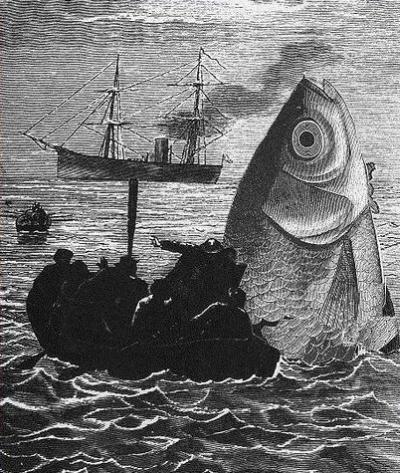 from
A week of kindness
Max Ernst
1934
_______________________
At the Edge of the Bed
Geoffrey G. O'Brien
Boston Review
No one yet has ever chosen misery
Those that seem to have done so
Haven’t any more than they have
Chosen this mist or is it rain
We would first have to own ourselves
Then give up on them entirely
Every day rather than once
And for all (which would be to seem
To have done so and not at all)
Like mist we speak of misery
In dissolves that don’t, disappearances
That can’t exactly be detected
That are not for detection in any
Senses we reliably seem to have
Is it your fault you don’t yet
Use your time, all of it, to defend
The weather against those wishing
To control it, if only by letting it
Be amplified in its present effects?
No one wants the wave to come
...(more)
_______________________
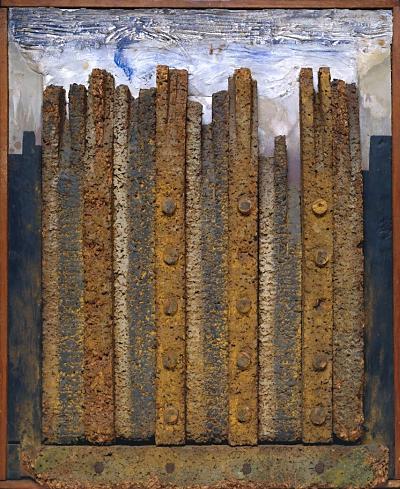
Dadaville
circa 1924
Max Ernst
(2 April 1891 – 1 April 1976)
_______________________
Digital Grab
Corporate Power Has Seized the Internet
Norman Solomon reviews Robert W. McChesney's Digital Disconnect: How Capitalism is Turning the Internet Against Democracy
common dreams
(....)
Plenty of commentators loudly celebrate the Internet. Some are vocal skeptics. “Both camps, with a few exceptions, have a single, deep, and often fatal flaw that severely compromises the value of their work,” McChesney writes. “That flaw, simply put, is ignorance about really existing capitalism and an underappreciation of how capitalism dominates social life. . . . Both camps miss the way capitalism defines our times and sets the terms for understanding not only the Internet, but most everything else of a social nature, including politics, in our society.”
And he adds: “The profit motive, commercialism, public relations, marketing, and advertising -- all defining features of contemporary corporate capitalism -- are foundational to any assessment of how the Internet has developed and is likely to develop.”
Concerns about the online world often fixate on cutting-edge digital tech. But, as McChesney points out, “the criticism of out-of-control technology is in large part a critique of out-of-control commercialism. The loneliness, alienation, and unhappiness sometimes ascribed to the Internet are also associated with a marketplace gone wild.”
Discourse about the Internet often proceeds as if digital technology has some kind of mind or will of its own. It does not.
...(more)
_______________________
Networks of Social Justice: Transnational Activism and Social Change
Studies in Social Justice
Vol 7, No 1 (2013)
_______________________
Plutocracy in America
Michael Brenner
(....)
When the system of law that is meant to order the workings of society without reference to ascriptive persons is made malleable in the hands of officials to serve the preferred interests of some, it ceases to be a neutral instrument for the common good. In today's society, it is becoming the instrument of a plutocracy.
Perhaps the most extraordinary achievement of the plutocracy's financial wing has been to win acceptance from the country's entire political class that its largely speculative activities are normal. Indeed, they are credited with being the economy's principal engine of growth. It follows that their well-being is crucial to the well-being of the national economy and, therefore, they should be given privileged treatment. How this was accomplished is the subject of a later commentary.
...(more)
_______________________
 the illustrious forger of dreams
Max Ernst's Blues
the lamentably late
Giornale Nuovo
_______________________
'Dancing in a straightjacket'
An interview with Ron Padgett
(....)
Shamma: It’s interesting, formally, to consider how the wall informs poems. Looking at, or being aware of the dimensions of the room can inform the dimensions of a poem. But also the turning away from the other space in the room, and writing a very personal poem, talking to a “you” but looking at a wall — it’s a strange kind of energy. I’m not really sure what to do with it.
Padgett: An interesting question is: What happens to the eyes of the writer as he or she is writing? Do they look at the wall? In Hollywood movies they do. I’m not sure I do. Usually I’m looking down at the page, and there’s a “room” there on that page, or at least a floorplan. Or if it’s a computer screen, it’s a window. And I’m looking through that window. That’d be another interesting approach: to see the computer screen as a window.
(....)
... to get back to the room idea: Take the physical structure and components of the room and see what poems, or parts of the poem, relate to parts of the room. Like the poem as “window” — Apollinaire has a poem called “The Windows.” The ceiling — what does the ceiling, the feeling of the ceiling, and the presence of a ceiling do to someone writing in a room? If you’re writing in a room with a high ceiling or a low one, or a tin ceiling — like this one here at Di Robertis — what does that do to you? And also the dimensions and proportions of the room — what do they do to one’s feelings and thinking? Also the walls — what are they made of? What do they look like? And the floors! Floors are more important than ceilings. Why is that? Why do I think that?
...(more)
_______________________
La Grande Permission: John ashbery in the 21st Century
Marjorie Perloff
(....)
We, need, accordingly, to rethink the poetic alignments of the late century as they look to us in 2010. I propose here to
go back to basics by looking more inductively than has recently been the case in the premises and working out of Ashbery’s
poetics. In his case, this is entirely possible because his lyric mode has not really changed appreciably in the course of his
career: we do not, in other words, have a case like early versus late Yeats here, although the late work of Ashbery is looser
than the earlier and more open to topical references. Let’s take as our example a characteristic but not-much-discussed
poem of the middle years. Here is “Variant” which appeared in the volume Houseboat Days (1977):
Variant”
Sometimes a word will start it, like
Hands and feet, sun and gloves. The way
Is fraught with danger, you say, and I
Notice the word “fraught” as you are telling
Me about huge secret valleys some distance from
The mired fighting—“but always, lightly wooded
As they are, more deeply involved with the outcome
That will someday paste a black, bleeding label
In the sky, but until then
The echo, flowing freely in corridors, alleys,
And tame, surprised places for from anywhere,
Will be automatically locked out—vox
Clamans—do you see? End of tomorrow.
don’t try to start the car or look deeper
Into the eternal wimpling of the sky: luster
On luster, transparency floated onto the topmost layer
until the whole thing overflows like a silver
Wedding cake or Christmas tree, in a cascade of tears.
(....)
Vox clamans—a voice crying, most usually in the wilderness or the desert—is introduced almost parenthetically in line
12 as perhaps the source of the echo, “do you see?” But in Ashbery’s poetry, the small object suddenly takes over the room.
The reference here is evidently to John Gower’s Vox Clamantis, the long (ten-thousand-line) fourteenth-century poem
that recounts in elegiac verse the events and tragedy of the 1381 Peasants’ Rising under the reign of Richard II. The Vox
Clamantis has a moral and prophetic charge, excoriating all orders of mankind and social class for their corruption and
need for reform. “The way fraught with danger,” the “mired fighting,” the “bleeding label in the sky”: all these could relate
to Gower’s dark political tale.
But the poem has no sooner introduced the vox clamans than, in a typically Ashberian move, it turns playful. “do you
see?” in line 13 is the turning point. No use worrying about the “end” when it’s the “End of tomorrow” and hence not yet
imminent. Then again tomorrow will come. And now, in one of those split-second shifts that Ashbery has spoken of vis-
ą-vis Reverdy, Gower’s landscape of empty valleys morphs into the world of film. “don’t try to start the car,” observes the
speaker—a warning that brings to my mind the famous scene in Alfred Hitchchock’s Shadow of a Doubt, where young
Charlie (Theresa Wright) tries to start the car with which her evil uncle Charlie has tampered and is almost asphyxiated in
the family garage. It is, after all, Charlie’s attempt to find out the truth—to “look deeper / Into the eternal wimpling of the
sky” (the medieval word “wimpling,” suggests impenetrability, literally a woman’s head covering, or rippling)—that gets our
heroine into trouble. And, come to think of it, Shadow of a Doubt is full of portents, signs to be read and echoes to be heard
and deciphered. The truth will out “luster/ On luster, transparency floated onto the topmost layer.”
But what exactly is happening?...(more)
TAB: The Journal of Poetry & Poeticsspace before text Vol 1, No 2 (2013)
_______________________

Switzerland, Birth-Place of Dada
Max Ernst
1920
_______________________
Three Seasons
Geoffrey G. O'Brien
(....)
That winter stopped and probably
on account of summer a spring,
spring with a sturdy fringe
and a local reputation,
it’s outside, in various rooms
and looks at everything,
a few lilacs in awkward
positions, but they were alright,
it was summer, very strong,
passing organizations,
which never finished anything
and ended in making
all this, cold coals
of wildflowers, little wars
at the centers, they go on for years
burning near the front
and from below.
...(more)
_______________________

photo - mw
_______________________
from Metropole
Geoffrey G. O'Brien
(....)
Someone other than the one who keeps the books, I use first person and the second tags along. You’d need to have the contracts long before your birth, be born on Sunday, translate living as the sentences that stopping on a dime go on. Do you recall how learning when alone felt much like leaving eastern states? The goal of reading prose was hold a stranger’s gaze until its coins had shaken you then ran to mother in the other room, but swap in jail for goal and getting off the bus too late
For other room, replace the words with prose with everything a walk across the park at 86th could be, the sentence with unplanned parades dispersing slowly blocks forgotten habits take new forms. Who are these men the winter streets impose, quotations? Typically, I take the nearest public transit, ripped from unknown thoughts by trains arriving go on walking through the snow, remember, stop, turn back and yes, it’s Lincoln Center. In falling right outside a lamppost’s glare I lost what I went back for every seven days
The index crashed between the pillars of the week. You’ll find a massive game of solitaire in progress underneath the window cops were laughing with the doorman in the dusk. I’m thinking of a statue going shopping in New York but stopping somewhere privately forgetting to perform. Each task contains this threat: you print the boarding pass invades the house. But he remembers holidays instead, decides to draw between all wounds a line when walking past the calendar, beginning with parked cars emitting outlines under snow
...(more)
The Offending Adam
_______________________
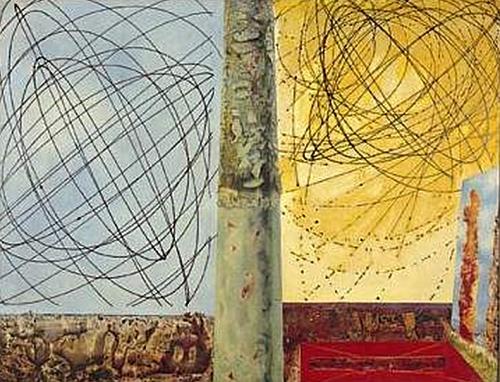
The Bewildered Planet
Max Ernst
1942
_______________________
It’s not just the drought treaty. Canada is vanishing from the United Nations
Paul Heinbecker
globe and mail
The decision to withdraw from the United Nations Convention on Desertification is the latest but regrettably likely not the last move to distance Canada from the world body. There is a disappearing character to contemporary Canadian multilateral diplomacy. Like Lewis Carroll's Cheshire cat, soon all that may remain of our country at the UN is a grin or, more accurately, a scowl.
_______________________
A letter to John Stuart Mill about the limits of what may be shown or said on the Web.
Jason Pontin
MIT Technology Review
(....)
John Stuart Mill, the Internet itself has a bias in favor of free expression. More, its technologies amplify free speech, widely distributing ideas and attitudes that would otherwise go unheard and cloaking speakers in pseudonymity or anonymity. In order to seem harmless, American Internet companies will fiddle with the sunny compromise, but it is an unsatisfactory hack. The Internet’s amplification of free speech will be resented by those who don’t like free speech, or whose motto is “Free speech for me but not for thee.” It will all be very messy, and sometimes violent. All over the world people hate free speech, because it is a counterintuitive good.
(....)
Who hates free speech? The powerful and the powerless: ruling parties and established religions, those who would suppress what is said in order to retain power, and those who would change what is said in order to alter the relations of power. Who else? Those who do not wish to be disturbed also hate free speech. Why, they might say, should I care about free speech? I have nothing to say; and insofar as things should be said at all, I only want to hear the things that people like me say. Why should I have to hear things that are offensive, immoral, or even mildly irritating?
(....)
Because free speech is so important, and because the Internet will continue to amplify its expressions, U.S. Internet companies should apply a consistent standard everywhere in deciding what they will censor upon request. (Their terms of service are their own business, so long as they are enforced fairly.) The only principle I can imagine working is yours, where “harm” is interpreted to mean physical or commercial injury but excludes personal, religious, or ideological offense. The companies should obey American laws about what expressions are legal, complying with local laws only when they are consistent with your principle, or else refuse to operate inside a country. In the final analysis, humans, prone to outraged rectitude, need the most free speech they can bear.
Heaven, I know, governs our affairs without a chief executive but with rotating committees of souls. (Vladimir Nabokov and Richard Feynman cochair the Committee on Light and Matter, where Nabokov oversees a Subcommittee on the Motion of the Shadow of Leaves on Sidewalks.) You argue all the time. Down here, we must follow your example although our circumstances are different. We have a right to say whatever we wish so long as we do not harm others, but we cannot compel others to listen, or expect never to be offended.
...(more)
_______________________
Onto-Cartography: Notes Towards a Borromean Critical Theory
Larval Subjects
York University, Department of Political Science Seminar Series, 2012-13, March 22, 2013
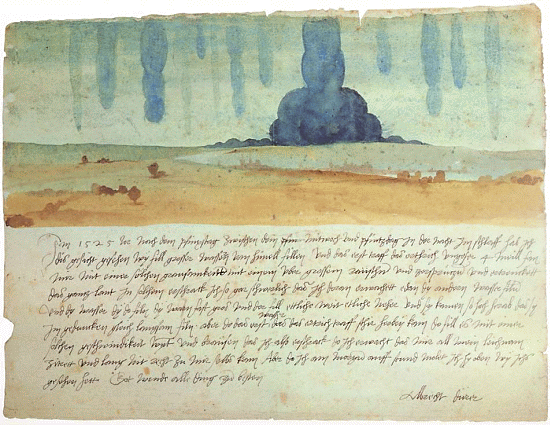
Dream Vision
(Apocalyptic Dream)
Albrecht Dürer
1525
Marguerite Yourcenar: On a Dream of Dürer'scourtesy of Tom Clark
(....)
Look closely at the sketch, or rather the wash drawing, which depicts this dream. The enormous waterspout like a mass of blue-black clouds involuntarily makes us think today of an atomic mushroom; but we must reject such an overly facile prefiguration. The landscape seems crushed in advance by the dirty blue floods that fall vertically from the sky; the earth and the water which has already fallen are mixed together in a muddy brown and murky gray: if one were obliged to identify this place with some spot on earth, one would think of the Lombard plain -- which Dürer crossed more than once -- because of the few scattered trees which are vaguely present in that atmosphere of catastrophe yet which one feels were planted and perhaps pollarded by the hand of man. Far off, made small by the distance, hardly perceptible at first glance, some brownish structures huddle at the edge of a bay, apparently ready to turn back into clay. What is about to be destroyed is not especially beautiful.
I repeat: there is no religious symbol in the margin, no avenging angels signifying God's wrath, no alchemical symbol of the "forces which descend," which would be pointless in the presence of the terrible gravitation of the cataracts. Nor is there any humanistic meditation, tragic as in Michelangelo or melancholy as it will be in Poussin, in the face of our greatness and smallness when confronted with the raging universe. Unless, perhaps, the best aspects of humanism are contained within this capacity, even in a dream and at the heart of a kind of ontological anguish, to persist in taking the measure of things.
...(more)
_______________________

Reading the news in France
Maynard Owen Williams
National Geographic Found
_______________________
Derrida: The Excluded Favorite
Emily Eakin reviews Derrida: A Biography, by Benoīt Peeters
(....)
It's hard to say what's more remarkable: that the so-called father of deconstruction was already hatching his apostasy while just barely out of his teens, or that the undertaking involved so much suffering. Peeters' Derrida is a nervous wreck: "a fragile and tormented man," prone to nausea, insomnia, exhaustion, and despair. By the summer of 1960, after failing to get a promised post as a maītre assistant at the Sorbonne and having spent the year teaching in a provincial capital instead, he was on Anafranil, one of the original anti-depressants, which had just appeared on the market. During another bout of the blues, he wrote to a friend from his infirmary bed, "I'm no good for anything except taking the world apart and putting it together again (and I manage the latter less and less frequently)."
That's not a bad description of deconstruction, an exercise in which unraveling-of meaning and coherence, of the kind of binary logic that tends to populate philosophical texts-is the path to illumination. In Derrida's reading, Western philosophers' preoccupation with first principles, a determination to capture reality, truth, "presence,"-what he called in reference to the phenomenologist Edmund Husserl "the thing itself"-was doomed. He traced this impulse in thinkers from Aristotle to Heidegger, famously arguing, for example, that a tendency to favor the immediacy of speech over the remoteness of writing was untenable. (Aristotle's formulation: "Spoken words are the symbols of mental experience and written words are the symbols of spoken words.") Through a series of deft and delicate maneuvers, Derrida sought to show that speech is inextricable from writing, no more or less authentic. The difference between the two depends, as all differences do, on a process of enforced absence or repression: a is a only because it is not b, and thus b is never entirely out of the picture.
Acts of exclusion, it turns out, were central to Derrida's perception of himself-the triggers, as he saw it, for his depression....(more)
_______________________
When Hope Tramples Truth
Roger Scruton
Why Are Pessimists Ignored?
(....)
... what was adaptive then might be profoundly maladaptive today, in the mass societies that we ourselves have created. It was adaptive in those small bands of hunter-gatherers to join the crowd, to persecute the doubter, to go cheerfully forward against the foe. And from these traits have sprung certain patterns of thinking that serve the vital purpose of preventing people from perceiving the truth, when the truth will discourage them.
I don't go along entirely with the evolutionary psychologists, who in my view pay insufficient attention to the change that civilization has wrought in our ways of dealing with each other. But I agree with them about one thing, which is that when truth threatens hope it is truth we usually sacrifice, often along with those who search for it.
...(more)
_______________________

photo - mw
_______________________
"The world-wide phenomenon of fundamentalism which in today's world is rooted in a distrust of modernity can only serve as futile aides for the helpless; it generates pseudo-certainties without the desire for further knowledge; in the long run it ruins the afflicted societies with the addictive drug of false certainty."
Peter Sloterdijk
Philosophical Moods
Jalees Rehman 3quarks
(....)
The expression "TEDtalking" may soon become a new form of insult, referring to the watering down and oversimplifying of complex ideas, the sharing of touching and life-changing personal stories or exuding excessive positivity which fills the audience with vacuous joy and earns a heartfelt applause. I always thought of Sloterdijk as the prototypical anti-TEDtalker, because his writings do not attempt to leave the reader in a happy and cozy place. Sloterdijk likes to challenge us, evoking intellectual unease and restlessness in our minds and invites us to disagree. His essays and books with all their digressions tend to be so long, that I thought it was inconceivable for him to condense them into a 15 minute TED time slot. Sloterdijk does not offer any convenient prefab take-home messages or TED-style smug happiness.
After reading "Philosophische Temperamente", I have begun to reconsider my views on Sloterdijk and TED-talks. In these 19 mini-essays, Sloterdijk gives TED-talks without TEDtalking. His TED stands for "Tease Entertain Disagree" and instead of the traditional TED motto of "Ideas worth spreading", Sloterdijk presents us with "Ideas worth critiquing". Perhaps the organizers and presenters at TED-conferences could learn something from Sloterdijk's style.
...(more)
_______________________

Alexander Graham Bell and Mabel
kissing within a tetrahedral kite
October 1903
Library of Congress
_______________________
Music in a Baghdad Alley
Sargon Boulus
Translated from Arabic by Sinan Antoon
No matter where you settle
or wander
That first melody is yours
At every arrival and departure
Its living face will meet you
at the entrance that remains
If you walk
and the opposing wind is in your face
and Death alone is the alternative
To hear it
departing between worlds, where you
go and come.
Did you not hear it one night
As you were passing under a balcony?
Your longing still anchors it
in the heart of wandering
A blind musician shaking it off
From the nooks in his lute
In a star-filled night, once upon a country
...(more)
April 2013: Writing from IraqWords without Borders
As part of our tenth-anniversary year, we are returning to the "Axis of Evil," Iraq, Iran, and North Korea, the subjects of our first three issues. We begin with Iraq, which has just passed its own ten-year milestone, one of bloody conflict and deadly political strife rather than fiction and poetry. From the Green Zone to a tiny mountain village, in battlefield chaos and domestic upheaval, Luay Hamza Abbas, Abd al-Khaliq al-Rikabi, Muhsin al-Ramli, Sinan Antoon, Ali Bader, Hassan Blasim, Sargon Boulus, Duna Ghali, Mahmoud Saeed, Salima Saleh, and Najem Wali record not only the decade of war but its effects on the home front. In our special section, we present reportage from Iraq by Algeria's Mustapha Benfodil and Poland's Mariusz Zawadzki.
_______________________

photo - mw
_______________________
Easter Carbon
Xero Hostel
dissident voice
Indeed it was "transformed utterly, utterly transformed," terrible no beauty: rocks, trees, amber waves of Mother under carbon. Grisley. Carbon. I knew her as skin. I remember Mother's skin.
Like I recall that car I'd sweated many hours to possess. Like I recall my wife; my lover's knees; the postman's odd resemblance to my sultry teenage girls.
I remember: heavy-metals like ice-cubes on a stove…and all the everythings before the Sun sucked light and color from what was, that is, so much…it was all just skin…
Same old, same old: idiots with matches playing god, igniting sudden empty, silent breathless, burnt black Dawn. The Sun also rises, still, yet, again. Dull coin in a pall.
...(more)
|




















































